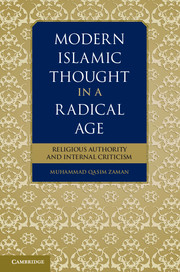2 - Rethinking Consensus
Published online by Cambridge University Press: 05 November 2012
Summary
Observers of modern Muslim societies, and not just scholars of Islamic law, have long recognized the centrality of the doctrine of consensus (ijma`) in Islam. This centrality is underscored above all by the place of consensus, alongside the Qur'an and the normative example of the Prophet Muhammad (sunna), as a fundamental source of law and legal norms in Sunni Islam. While Shi`i jurists have usually been far less certain of it, consensus has wielded considerable authority even among the Shi`a. Whether consensus meant the agreement of the community as a whole or only that of its legal scholars has long been debated, although premodern jurists – the people primarily writing about the matter – typically limited it to their own ranks. There also was debate about precisely how consensus was arrived at or how the fact that it had indeed been reached was ascertained. For all the uncertainties about it, the authority of consensus, once arrived at and ascertained, was nonetheless denied by few, and Muhammad's reported statement that the community “would not agree on an error” was both widely accepted and influential.
Yet no foundational source of Islamic legal norms has been more severely challenged in modern times than the doctrine of consensus. It is true that the statements attributed to the Prophet Muhammad have also been the subject of much debate. Such debate has usually been concerned, however, with the authenticity of particular reports, not the normative authority of his teachings themselves. By contrast, rejection of consensus has often been more categorical. Islamist critiques of the wrong turns Muslims have allegedly taken throughout the course of their history are also an indictment, for instance, of the traditional Sunni view that the community as a whole is protected against error. For their part, Muslim modernists have often been vehement in imputing the intellectual decline of Muslim societies to the doctrine of consensus. Modernist critiques of consensus take various forms, but there remains a powerful narrative that views consensus as having encouraged servile conformity to authority and thus a concomitant hostility to growth, innovation, and change – in law as in other facets of Muslim life. The Pakistani modernist Fazlur Rahman (d. 1988) spoke for many others when he characterized consensus as a mechanism of “traditional authoritarianism” and as a major cause of the “stagnation” of Sunni Islam in the premodern period.
- Type
- Chapter
- Information
- Modern Islamic Thought in a Radical AgeReligious Authority and Internal Criticism, pp. 45 - 74Publisher: Cambridge University PressPrint publication year: 2012



